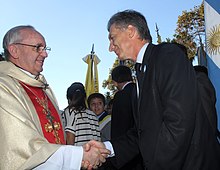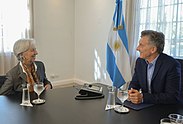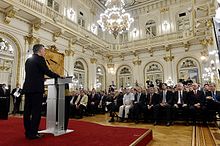Mauricio Macri
[6][7][8] He aligned the country with gradualist neoliberalism and re-opened Argentina to international markets by lifting currency controls (which he reinstated shortly before his term ended), restructuring sovereign debt, and pressing free-market solutions.
[10] Macri improved the relations with the United States[11] and from Mercosur achieved a free trade agreement with the European Union[12] and closer ties with the Pacific Alliance.
His presidency has been praised for leaving a legacy of anti-corruption[15] and increasing Argentina's sovereign marketability,[16][17] but has been criticized for failing to materially reform the economy,[18][19] falling short of containing inflation,[20][21] and building up external debt.
Macri supported Boca Juniors, paying coach César Luis Menotti's salary and buying players for the team (including forward Walter Perazzo).
[29][30] His first years were unsuccessful; the team's performance was poor, players frequently complained about salaries and bonuses, and Macri changed coaches three times.
[33] New coach Carlos Bianchi helped Juan Román Riquelme improve his performance, and had Martín Palermo and Guillermo Barros Schelotto as effective forwards.
[42] In 2005, Macri joined Ricardo López Murphy of Recrear in a political coalition, the Republican Proposal (PRO), and was elected to the Chamber of Deputies with 33.9 percent of the vote.
[45] Ibarra was impeached and removed from office in 2006 as a result of the República Cromañón nightclub fire, and his term was completed by vice-chief of government Jorge Telerman.
Before the 2007 general elections, he negotiated with the likely presidential candidate Jorge Sobisch, the governor of Neuquén Province, to create a national right-wing political coalition.
[48] He immediately backed out of his pact with Sobisch and remained neutral during the national election,[49] which was won by Cristina Fernández de Kirchner of the Front for Victory (FPV).
The alliance was successful; De Narvaez defeated former president Néstor Kirchner in Buenos Aires Province and Gabriela Michetti won the city election.
The Argentine Federal Police, under national-government jurisdiction, still worked in the city and disputes over a potential transfer to a local force were unresolved when Macri was elected.
A member of the police unit which rescued Macri from his kidnappers, Palacios was fired by then-President Néstor Kirchner for his alleged involvement in the murder of Axel Blumberg (for which he was acquitted).
[66] A gay couple, José María Di Bello and Alex Freyre, started a judicial case so that they could get married in Buenos Aires.
With President Cristina Kirchner unable to run, early opinion polls indicated a close three-way race between Macri, Kirchnerite governor Daniel Scioli and Tigre mayor Sergio Massa.
[85] He was renominated, but scored only 32%, compared to 47% to populist Peronist Alberto Fernández and his running mate, two-term former president Cristina Kirchner, in their primary for Frente de Todos.
[92] They disagreed about its location; Kirchner wanted it to take place at the Palace of the Argentine National Congress, and Macri favoured the White Hall of the Casa Rosada.
Macri delivered a 27-minute speech pledging "support for an independent judiciary, to fight corruption and drug trafficking, the internal union of Argentina, universal social protection, a 21st-century style of education and for everyone to have a roof, water and sewer" and greeted his electoral rivals.
Minutes later, Macri went to the balcony and told the crowd in the Plaza de Mayo that "Argentines deserve to live better, and we are about to start a wonderful period for our country.
[99] After his swearing-in, Macri hosted a reception at the Ministry of Foreign Affairs' San Martín Palace for heads of state Michelle Bachelet (Chile), Horacio Cartes (Paraguay), Juan Manuel Santos (Colombia), Rafael Correa (Ecuador), Evo Morales (Bolivia), Dilma Rousseff (Brazil) and King Juan Carlos I of Spain, and representatives of other countries who attended his inauguration.
[111] On 19 January 2016, Macri attended the World Economic Forum in Davos, Switzerland, with opposition figure Sergio Massa and part of his cabinet, in a search for investors.
[39] In 2016, Minister Juan José Aranguren arranged the removal of state subsidies for electricity, gas and water, which caused a huge increase in prices for those utilities.
[144] The government modified the public holiday for the Day of Remembrance for Truth and Justice, which makes reference to the 1976 Argentine coup d'état, to allow it to be celebrated on a movable date.
The feminist movement organized several demonstrations in the following months, in support of the voluntary termination of pregnancy abortion bill that was proposed in Congress.
[150] In December 2017, police officer Luis Chocobar killed a fleeing man who had stabbed an American tourist in La Boca, Buenos Aires.
[160] Furthermore, during the Venezuelan uprising attempt of April 2019, Macri supported anti-Maduro military forces and reiterated his position of recognizing Guaidó as legitimate President of Venezuela.
During a visit in 2016, president Barack Obama praised him: "I'm impressed because he has moved rapidly on so many of the reforms that he promised, to create more sustainable and inclusive economic growth, to reconnect Argentina with the global economy and the world community".
[166] Those cases and Nisman's probe into Cristina Kirchner involvement with Iran have special importance for Argentina–Israel relations, and ambassador Carlos Faustino García and Israeli diplomat Modi Efraim praised Macri for encouraging the investigations.
[188] Prosecutor Viviana Montiel asked local judge Raúl Gutiérrez to order Sala's arrest for causing a disturbance and encouraging crime.
This caused President Evo Morales to resign and the military and police of Bolivia clashed with pro-Morales protesters, resulting in dozens of deaths from the engagement.





















